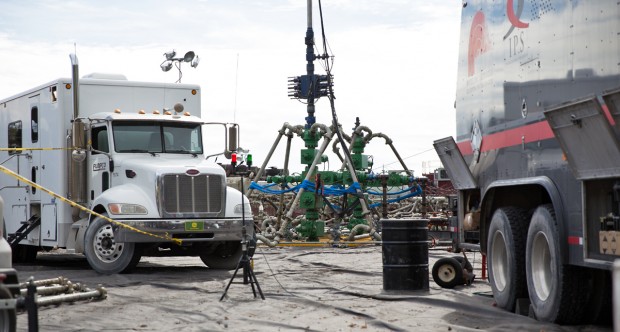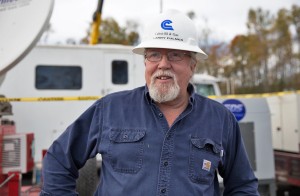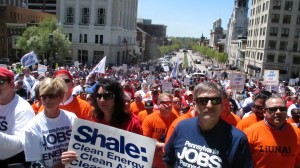No matter how you spell it, fracking stirs controversy
-
Marie Cusick
The word fracking was among 150 new terms added to the Merriam-Webster dictionary this month. It’s defined as, “the injection of fluid into shale beds at high pressure in order to free up petroleum resources.”
Despite this official definition, both the spelling and meaning of fracking remain controversial.
“They added the K to make it look like a bad word”
Larry Fulmer is the hydraulic fracturing superintendent for Cabot Oil and Gas in the Northeast region. Looking out over the company’s operations in Susquehanna County, he says he’s been safely fracking for decades.
Like many in the industry, he prefers the spelling frac’ing.
Fulmer believes the more popular — and now dictionary spelling — with a K is a deliberate attempt to make it look more like another word that begins with an F and ends with a CK.
“It was a term brought about by people who are against the exploration of natural gas up here,” he says. “They added the K to make it look like a bad word– to diminish what we’re doing.”
It’s true that fracking has sparked fierce opposition from many environmentalists who worry about its effects on air and water quality.
They often do use it as a substitution for the F word, holding signs at rallies with slogans like “Frack off” and “No fracking way.”
But in this case, the spelling is purely a coincidence, says Peter Sokolowski, editor-at-large for the Merriam-Webster dictionary.
“Without the K it would very often be read, perhaps, with a soft C. So I’m going to guess this is more phonetic than ideological.”
The first known written citation of the word dates back to 1953 in a headline for an oil and gas industry journal that reads, “Fracking: A New Exploratory Tool.”
It’s spelled with a K.
But as the use of fracking has greatly expanded, so has its meaning, says Scott Perry, head of the Oil and Gas Bureau of Pennsylvania’s Department of Environmental Protection.
“Fracking has taken on a meaning that involves everything from building the well site, to drilling the well, to actually hydraulically fracturing the well, to plugging the well, to site restoration.”
Embracing the F word
The battle over the word is part of a larger high-stakes debate over gas development.
Environmental opponents point to cases of water contamination and accidents. But the industry insists it can be done safely.
Many people who work in the oil and gas business avoid the term fracking.
Earlier this month, more than 2,000 people turned out for a pro-gas rally in Harrisburg.
Instead of fracking, their T-shirts and signs had words like energy, jobs and shale gas.
But some have embraced the F word, like Matt Pitzarella, a spokesman for one of the state’s biggest drillers, Range Resources.
“The reality is if you don’t use the word, you’re not going to be part of that discussion because no one else uses it,” he says. “If someone goes on the Internet and they start typing in ‘fracking’ and the industry uses a C with an apostrophe, you’re going to lose opportunities to talk to people.”
As fracking continues across the country, the editors at Merriam-Webster have their eye on other iterations of the word. Both the verb form, to frack, and the adjective, as in fracked gas, could soon be new additions to the dictionary.



















